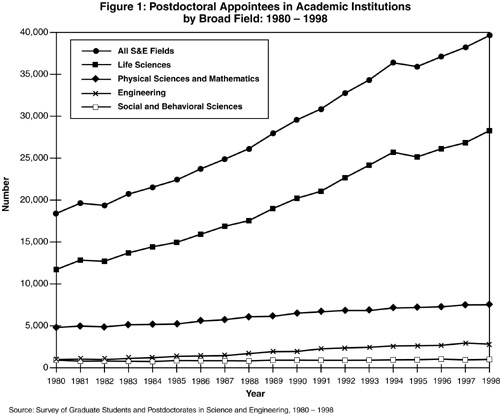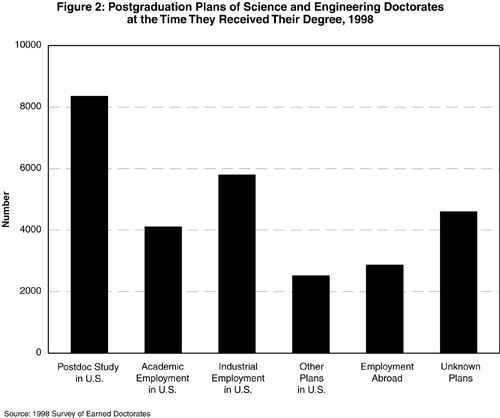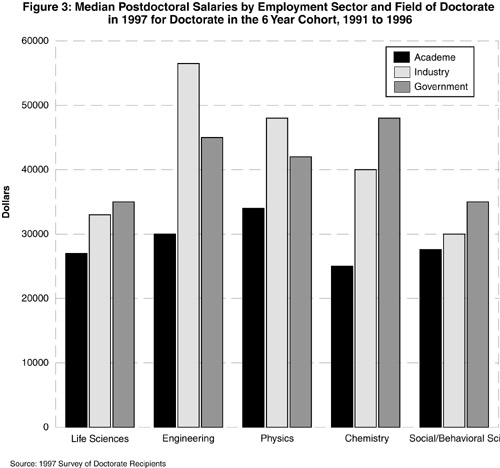Enhancing the Postdoctoral Experience
The growing population of postdoctoral scholars needs better working conditions, compensation, and benefits.
In recent years, this nation’s science and engineering research has come to depend increasingly on the work of postdoctoral scholars, or postdocs: junior researchers who have a Ph.D. and are pursuing further training in research. It is largely these postdocs who carry out the sometimes exhilarating, sometimes tedious, day-to-day work of research. Many of them will go on to uncover fundamental new knowledge, chair prestigious academic departments, and form the fast-growing technology companies that power our economy. It is largely they who account for the extraordinary productivity of science and engineering research in the United States.
And yet the postdoctoral experience is not all it should be. The National Academies of Science and Engineering and the Institute of Medicine’s Committee on Science, Engineering, and Public Policy (COSEPUP), which I chair, has recently studied the subject, and in September 2000 we issued a guide entitled Enhancing the Postdoctoral Experience for Scientists and Engineers (National Academy Press, 2000). During its study, the committee heard from many postdocs who have had stimulating, well-supervised, and productive research experiences. But it also heard from postdocs who have been neglected, underpaid, and even exploited; who have been poorly matched with their research settings; and who have found little opportunity to grow toward independence or to benefit from the guidance of a mentor.
At some institutions, notably universities, the definition of postdoc is vague and can vary considerably. Most postdocs and their appointments, however, have the following qualities: The appointee has received a Ph.D. or doctorate equivalent; the appointment is viewed as occupying a training or transitional period preparatory to a long-term academic, industrial, government, or other full-time research career; the appointment involves full-time research or scholarship; and the appointment is temporary.
The population of postdocs has roughly doubled in the past 20 years to an estimated 52,000. About three-fourths of them work in the life sciences, where postdoctoral experience is virtually required for most advanced positions, whether in industry, government, or universities.
Most postdoctoral appointments are in university settings, where postdocs’ status is most likely to be uncertain. Although postdocs in industry and government laboratories tend to fit smoothly into preexisting categories, those in universities are often neither faculty, staff, nor students. Consequently, there is often no clearly defined administrative responsibility for ensuring their fair compensation, benefits, or job security. Postdocs often receive no explicit statement of the terms or duration of their appointments and have no place to go to determine appropriate expectations or to redress grievances. Commonly, the sole person to whom they can turn is the researcher who hired them and on whom they depend in their current positions and for assistance and support in moving on to independent careers.
The committee learned of other unfortunate outcomes of the rapid growth of the postdoc population under these irregular conditions. The annual compensation for first-year postdocs can vary by tens of thousands of dollars, depending on field and type of institution, even when the levels of talent, responsibility, and output are virtually the same. At the lower end of the range, which is typical of the life sciences and some of the physical sciences in academe, pay is embarrassingly inadequate, especially for those with families, and is not comparable with that received by other professionals at analogous career stages. There is no standard health benefit package for postdocs; in fact, many receive no health benefits for their families, and some have no health coverage for themselves.
The information gap
In our investigation we found surprisingly few data on the postdoctoral experience; to those we found we added information of our own, gathered through workshops, a nationwide survey, and some three dozen focus groups. Here are some common questions about the postdoctoral experience, and the answers we found:
How long does a postdoctoral appointment last? The median term for all postdocs is about 2.5 years, but terms vary widely by field. In engineering, a year is usually enough; in the life sciences, the median stay for postdocs is 3.5 years, but many stay for 5 years or more. Terms for physical scientists are usually 2 years (chemistry) or 3 years (physics), but some physical scientists remain postdocs for 6 years, and a few remain indefinitely in an undefined postdoctoral category.
Why do Ph.D. recipients want to be postdocs? According to the 1997 Survey of Doctorate Recipients, the most common reasons for a Ph.D. to seek a postdoctoral appointment are to deepen research mastery or acquire additional training (43 percent) and to acquire training outside the Ph.D. field (13 percent). A substantial proportion (18 percent) choose additional training because they want to work with a specific person. The remainder of survey respondents say that they are unable to find other employment (18 percent) or cite other reasons (8 percent).
Where do postdocs work? About 80 percent of postdocs work in universities, 13 percent in government, and 7 percent in industrial settings. Within academe, 272 institutions have postdocs; most are concentrated at the largest research-intensive institutions.
What compensation do postdocs receive? The average annual median earnings of a postdoc, including all sectors (university, government, and industry), was $30,000 in 1997. Most postdocs are in the academic sector, where they earned about $28,000. That salary is lower than that of people in roughly their age range (25 to 34 years) in the United States with a bachelor’s degree ($35,030), master’s degree ($40,800), doctoral degree ($47,780), or professional degree ($58,080). Many of the most desirable postdoc positions are in large, expensive urban areas, and as postdocs become older, many of them have families to support. Most postdocs are over 30 and married, and almost half have children. In addition, whereas others of their same age group and education level are likely to have at least medical benefits (not to mention vacation, sick, and parental leave and retirement and other standard benefits), this is frequently not the case for postdocs at academic institutions.
Who supplies the funding to support postdocs? Most postdocs are supported on the grant of a principal investigator (PI) from a federal agency, such as the National Institutes of Health or the National Science Foundation (NSF). A smaller number bring their own funding in the form of fellowships and traineeships. For example, of the almost 4,500 postdocs supported by NSF, only about 200 are supported by fellowships; the rest are supported by the grants of their PIs.
After reflecting on its information, the committee concluded that most postdocs are gaining valuable research experience and acquiring important laboratory skills, but that the overall postdoctoral experience must encompass more than research if it is to fulfill its potential. For example, many postdocs in our focus groups told us that they do not receive training or practice in skills they are likely to need later, such as teaching, writing grant proposals, supervising others, running labs, communicating with people outside their specialty, and working in teams. These skills are certainly needed in traditional academic positions, and some of them are essential in many of the “nontraditional” settings where postdocs now find jobs, such as industrial firms, independent consulting, and the world of private investment. Similarly, the percentage of Ph.D.s who take postdoctoral appointments because they cannot find more desirable positions or who stay in those positions more than two or three years indicates that at least some postdoctoral experiences are less than fulfilling.
Building a better postdoc
In response to these findings, COSEPUP began by setting out several guiding principles for the postdoctoral experience:
First, the postdoctoral experience is first and foremost an apprenticeship. By that we mean its purpose is to gain scientific, technical, and professional skills that advance the professional career.
Second, postdocs should receive appropriate compensation, benefits, and professional recognition for their contributions to research.
Third, to ensure that postdoctoral appointments are beneficial to all concerned, all parties to an appointment should have a clear and mutually understood concept of its nature and purpose.
No single organization or group can enhance the experience by itself. Rather, it will take the combined effort of the postdocs themselves, their advisers, their host institutions, the funding organizations, and disciplinary societies.
To be effective, reforms will have to be collaborative endeavors: The postdocs themselves must play a role in promoting good communication with their advisers and making the best use of their opportunities. Advisers must invest time and effort to help make each postdoctoral experience an educational one. Host institutions must provide postdocs with full membership in the institutional community, help to ensure adequate stipends, and provide logistic and career-planning support. Funding organizations must take more responsibility in providing adequate stipend levels and creating incentives for good mentoring. Disciplinary societies also can play an important role in catalyzing and supporting reform, particularly because the needed changes vary from one scientific field to another.
COSEPUP developed a series of actions that should be pursued by all of the individuals and institutions involved in the postdoctoral experience:
- Award institutional recognition, status, and compensation commensurate with the postdocs’ contributions to the research enterprise.
- Develop distinct policies and standards for postdocs, modeled on those available for graduate students and faculty.
- Develop mechanisms for frequent and regular communication between postdocs and their advisers, institutions, funding organizations, and disciplinary societies.
- Monitor and provide formal evaluations (at least annually) of the performance of postdocs.
- Ensure that all postdocs have access to health insurance, regardless of funding source, and to institutional services.
- Set limits for total time as a postdoc (of approximately five years, including time at all institutions), with clearly described exceptions as appropriate.
- Invite the participation of postdocs when creating standards, definitions, and conditions for appointments.
- Provide substantive career guidance to improve a postdoc’s ability to prepare for regular employment.
- Improve the quality of data about postdoctoral working conditions and about the population of postdocs in relation to employment prospects in research.
- Take steps to improve the transition of postdocs to regular career positions.
Today’s postdoctoral experience has many marvelous aspects, and these must continue. But it also has elements that are not working well, and these should be improved. COSEPUP hopes that this new guide will help to maintain the vigor, excitement, and leadership of the U.S. research community while ensuring maximum opportunity for all.



